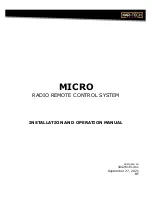
I N S T A L L A T I O N
Special considerations for vehicles, vessels etc.
Mount the device and all the cables securely to the installation base in order to avoid product damage due to shocks
and vibrations. Sharp bending of cables, especially RF cables, must be avoided.
The positive voltage must be taken directly from the battery, unless the mains voltage of the vehicle differs from 12
V. This minimizes the risk of disturbances from or to the radio module, as well as guarantees a loss-free power
distribution. The grounding cable is connected to the car chassis with a lead as short as possible (NOT directly from
the negative pole of the battery).
If the vehicle has a +24 V electrical system (trucks, all-terrain vehicles, etc), an external voltage converter must be
used. The converter must be well protected against transients produced by the vehicle's electrical system. It must
also be capable of maintaining a stable output during the rapid changes in the load current. Some vehicles have a
main switch (for instance the gas trucks) that separates the chassis of the vehicle from the negative lead of the
battery. Never pass this switch, that is, the grounding of the reducer must be taken from the body of the vehicle,
NOT directly from the battery.
Lightning protection
Protect the antennas in particular from lightning using lightning rods, surge arrestors, gas discharge tubes and/or
other methods. As the installation and climatic conditions vary, the customer is always responsible for the lightning
protection of the final installation.
Grounding
The TDM880i has been designed for negative ground systems. If you install the TDM880i in a system with positive
ground, take a special care to ensure that the grounding and supply voltages are correctly connected. All the input
and output signal voltages in this document are always referred to the GND pins of the connector X104 (pins 6,7 and
8).
Starting up
Starting up after flash / parametrization
1. Remove the parametrization/flash cable.
2. Power down the device.
3. If you have to check the GPS and/or network functionality, connect the antennas.
Optional
4. Power up the device.
5. Make sure that the red Power On LED is lit. This tells you that the device is powered on and the root software is
running.
Verifying the AT functionality
1. Power down the device.
2. Connect the DLR-3T cable to a COM port of a PC, and connect the DLR-3T with the CA-125 and radio module.
3. Power up the device.
4. Open a serial connection to the device using an appropriate terminal program, for example the HyperTerminal.
Communication settings:
• 9600 baud
• 8 data bits
• N (no parity)
• 1 stop
• none (handshake)
5. Execute the AT info command. Check that the device replies with OK as in the following sequence:
> AT
OK
.
















































